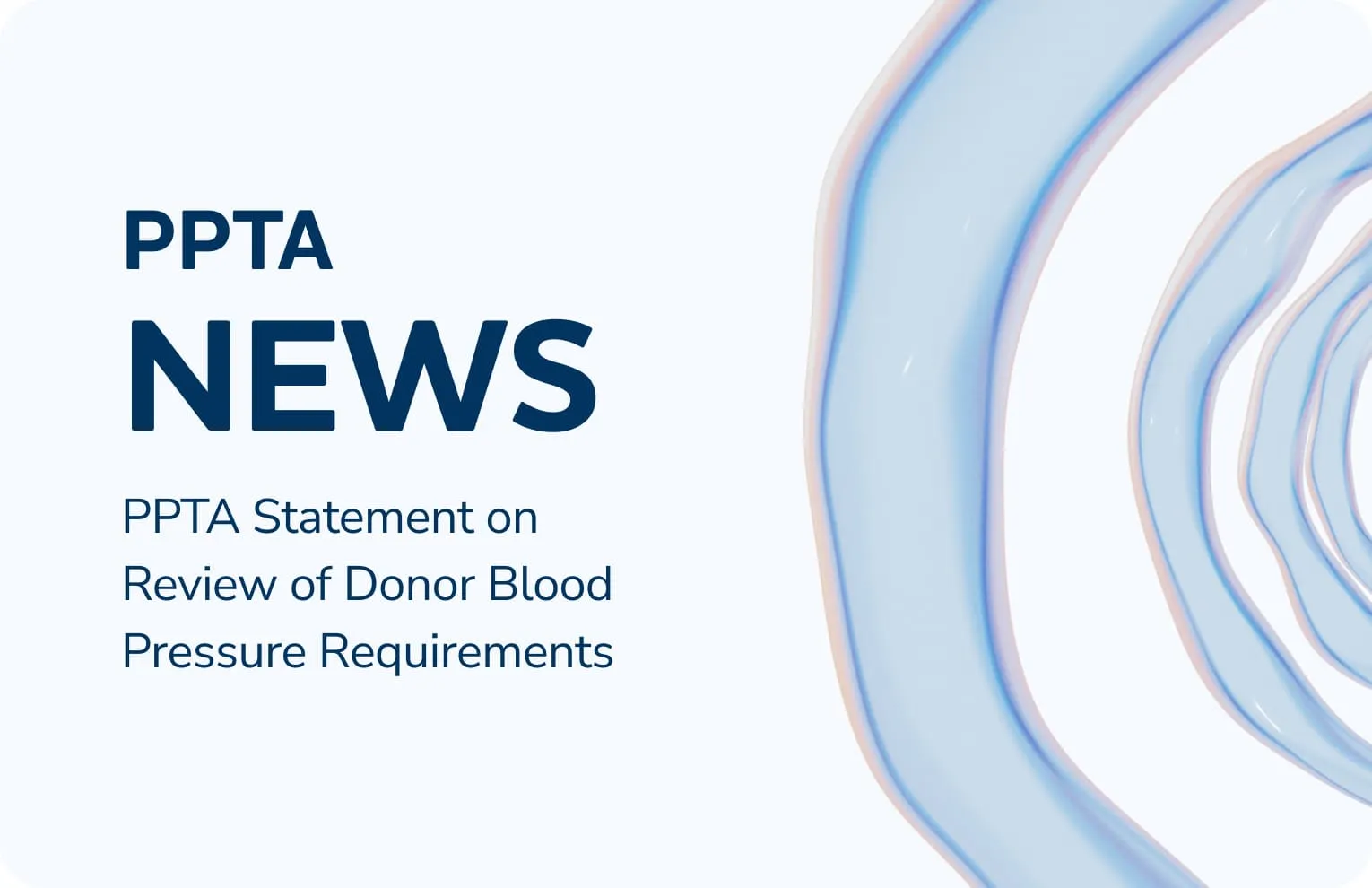The Plasma Protein Therapeutics Association (PPTA) welcomes the call in the draft report on the European Commission's proposal for a Regulation on the Standards of quality and safety for substances of human origin (SoHO) by European Parliament rapporteur MEP Nathalie Colin-Oesterlé to reach higher strategic autonomy for plasma supply for the manufacturing of plasma-derived medicinal products (PDMPs). However, we believe that several of the proposals will likely have a contrary effect to that goal. They could place at serious risk patient access to life-saving therapies and potentially jeopardise existing plasma collection models that are proven to be safe and effective.
Plasma donation does not imply a significant risk
Rather than address the European Commission’s mischaracterisation of plasma donation as creating “significant risk”, the proposed amendments maintain emphasis on this and offer the prospect of more restrictive regulation which would likely reduce donation volumes. There is no scientific basis for the use of this language. Scientific studies[i], as well as EU haemovigilance reporting[ii] have consistently shown that plasma donation is safe for donors and presents a low risk, similar to that of blood donation. Moreover, donor protection measures, including regulation on frequency of donation, are already implemented in all EU countries, and any changes to these measures should be supported by scientific evidence. Concerns about the use of this language are shared by the Platform of Plasma Users (PLUS), a consortium of seven patient organisations, representing people living with treatable rare plasma-related disorders, such as haemophilia, primary immunodeficiencies and alpha1 anti-trypsin deficiency, among others, and representing the views of over 110,000 patients in Europe who are regular users of plasma or plasma-derived products. Following their January Stakeholders Conference[iii] they, together with other interested stakeholders, published a consensus statement calling for this language to be amended.
Regardless of whether donors receive financial compensation to donate plasma or not, PDMPs are safe
The proposed amendments (to article 57) reflect a misperception that compensating plasma donors financially has an impact on the safety of PDMPs. In fact, the European Medicines Agency concluded that regardless of how donors are compensated, the safety of plasma-derived medicinal products is not impacted. This has been echoed by the organisations who attended the PLUS conference.
Compensating donors using a fixed-rate allowance is compatible with the VUD principle
While the Commission’s report acknowledged that compensating plasma donors with a fixed-rate allowance is consistent with the Voluntary Unpaid Principle (VUD), the amendment to the definition for compensating donors for “quantifiable losses” undermines this principle, would be complex to implement and likely impact donation volumes. In the four EU countries in which the private sector collects plasma in coexistence with the non-for-profit and public sector (Germany, Austria, Czechia and Hungary), fixed-rate compensation levels are set by national regulators in compliance with the VUD principle and in adherence to the Charter of Fundamental Rights of the European Union. These countries collect 44% of the total plasma volume collected in the EU. If it were applied, this new definition of compensation for “quantifiable losses” could put at risk existing collection models in countries and consequently put patient access to PDMPs at significant risk. Instead, we recommend that the definition include wording contained within the Cells and Tissues Directive, which clarifies that “donors may receive compensation, making good the expenses and inconveniences related to the donation”. This definition provides greater clarity and certainty to SoHO entities, while upholding the VUD principle.
Import restrictions put patient access at risk
Proposed amendments by the rapporteur could lead to Member States putting in place import restrictions between Member States (article 26 para 3) and from third countries (article 4 para 1 a new), which would include the US which provides 40% of EU plasma needs – again placing patient access to life-saving therapies at serious risk.
It could also jeopardise patient access globally given Europe has the largest manufacturing capacity for PDMPs in the world. There are, for example, PDMPs produced only in Europe that are supplied to countries around the world. The implementation of import restrictions would compromise the global supply chain and goes against the principles of open strategic autonomy.
Conclusion
We share the goal of creating greater strategic autonomy for Europe in relation to supply of SoHO but believe that the proposed changes to the SoHO Regulation may work against this. We welcome continued dialogue to help inform discussion and debate towards enabling the EU to collect more plasma to secure a sustainable supply of life-saving PDMPs for the 300,000 patients in Europe who rely on them.
References
[i] Schreiber GB, Becker M, Fransen M, Hershman J, Lenart J, Song G, et al. 2021 “Plasmavigilance – Adverse events among U.S. source plasma donors.” Transfusion 2941-57
Gustafson M. Source Plasma Donor Hemovigilance Activities and Results. Available from: https://cdn.prod.website-files.com/638f893112c6eac0e46ac576/645391e5ed98576842df695e_%231Gustafson_PlasmaVigilance100817.pdf (Pilot study).
Hartmann J, Ragusa MJ, Burchardt ER, Manukyan Z, Popovsky MA, Leitman SF. Personalized collection of plasma from healthy donors: a randomized controlled trial of a novel technologyenabled nomogram. Transfusion. 2021;61:1789–98.
Cho JH, Rajbhandary S, van Buren NL, Fung MK, Al-Ghafry M, Fridey JL, et al. The safety of COVID-19 convalescent plasma donation: a multi-institutional donor hemovigilance study. Transfusion. 2021;61(9):2668–76
Cho JH, Hiskey M. Plasmavigilance: Source plasma joins the call to arms. Transfusion. 2021 Oct;61(10):2803-2805. doi: 10.1111/trf.16668. PMID: 34605562
[iii] On 24th and 25th January 2023, PLUS (Platform of Plasma Protein Users, a coalition of organisations of patients with rare plasma-related disorders whose lives rely on plasma proteins products) organised a Stakeholders Conference in which the following organisations were present: Alpha-1 Belgium, American Plasma Users Coalition (A-PLUS), European Blood Alliance (EBA), European Haemophilia Consortium (EHC), European Plasma Alliance, GBS-CIDP International Foundation, International Federation of Blood Donor Organisations, International Plasma Fractionation Association (IPFA), International Patient Organisation for Primary Immunodeficiencies (IPOPI), Plasma Protein Therapeutics Association (PPTA). https://plasmausers.org/wp-content/uploads/2023/02/PLUS-Consensus-Conference-2023-agreed-points_final-with-logos-23.01.31_web.pdf
Created on February 14 2023.





